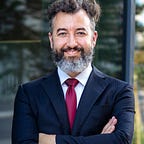Cultivating Creativity
I used to think that I wasn’t creative. My brother was always the creative one. He was the one who was the musician and the artist, so for our birthdays and any holidays that we would get presents, he would always get the art supplies, the paint supplies, the musical instruments, and then I would get the chemistry sets, the microscopes and things like that. There’s nothing wrong with that, my parents just put us in different worlds and that was really good for me in that instilled an analytic mindset and a critical mindset but something I realized along my life’s journey, along my educational career path, is that creativity is not something you’re just born with, creativity is really something we can cultivate and something we can encourage not only in our children but in ourselves. We can really find ways of becoming more creative as we grow, both in our careers and in our educational careers.
I think it’s important when we talk about creativity that we have to remind ourselves to think like a child. There’s an old, and I think it’s a Buddhist, saying that a child’s mind can really solve problems or something along those lines. I’m obviously paraphrasing because don’t know the exact quote but the point is that as a child we have an immense capacity for creating new ideas, we can kind of invent things out of almost nothing, just some toys or some scraps of paper or scraps of cloth and suddenly we have something new that you might never have imagined before. I think this activity of creation is so important and in our adult lives it’s so important not just to be able to craft interesting gifts for people and kind of do some DIY things but also in our work, being creative in our work means that we can come up with new solutions to some really challenging issues that are out there.
One of my favorite activities that I give my students is a basic challenge to come up with 30 ideas for using an everyday object in a way that it’s not conventional. How can you take a pen and use it for something other than a pen? I put a five-minute timer on the clock and I say “come up with 30 ideas in five minutes for a way to use a pen other than as a pen” and at first a lot of them get stuck immediately. They can’t get out of that mindset that a pen is a pen. We use a pen to draw with or to write. A pen couldn’t be anything else. Then some of the students just jump right in and they say, oh pen can be a straw or it can be a telescope or it can be all these different things.
I think there’s something that happens along the way. Maybe it’s the way we’re brought up as children. Maybe it’s an educational system that not kills but certainly compacts or compartmentalizes that creative mindset that we really need in our work and we really need in our lives.
If you’ve left creativity behind. If you’ve not had a chance to really embrace the more creative aspects of your work or your life, it’s not too late. You can certainly take this opportunity as a reminder to think about how you can apply creative thinking in your everyday work. Maybe it is just coming up with 30 new ideas for an everyday challenge that you experience at work, and maybe some of those ideas can come off the ground. Maybe they could actually work. I think this is what makes innovation. This is what makes innovation new. This is what adds the invention to innovation, being creative and being able to create really interesting and compelling solutions to really difficult problems.
Again if you’re a creative type and you think of yourself as a creative person, maybe you studied art, maybe you studied music in your academic career, great, lean into that. If you’re working in some other capacity, maybe you’re not in the creative arts industry, then still you can apply those same techniques those same ways of thinking to your work. If you’re one of those people like how I was brought up, always thinking of themselves as analytical and calculating and not really involved in creativity, then give it a shot.
I would imagine that being able to reset your approach to your work and find ways of making creativity part of your job will really expand the possibilities for your work.
This article was first published as part of the Universal Design in Life and Work podcast.
